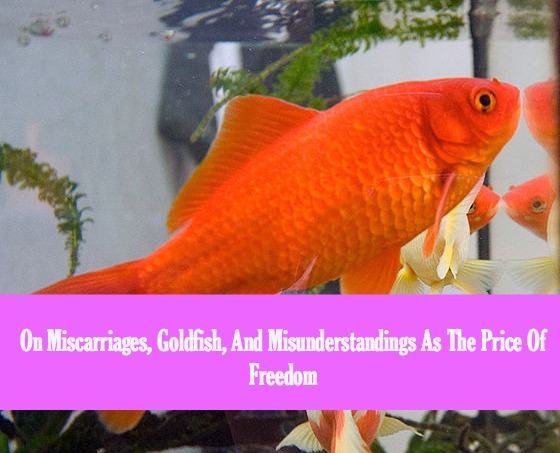Dear Jen,
My blatant overshare is that I’ve had two miscarriages this winter, and what I didn’t realize before was that miscarriage totally blows. Women get all the worst shit to deal with! Nobody really gets it (including your partner, even if he kindly doesn’t judge your need to drown yourself in the antiseptic waters of a Gilmore Girls marathon, an odd impulse I never knew I had in me), people refuse to talk or even think about it and, if you’re me, you end up obsessively going over every detail of every day that you were pregnant, trying to pinpoint exactly what went wrong. The truth is that these things are wildly more common than anyone realizes. What’s even more horrifying is that in half of these cases, there is never any reason found. So you basically have no control over it, and no amount of raspberry leaf tea you drank after finding out you were pregnant are the reason that you lost it. For someone impatient with a need for control, this is extremely hard to come to terms with.
I’ve had a hard time admitting any of this to friends and family, but I’ve found this weird need to be frank with distant acquaintances or long-lost friends who live in other countries. I also have this strong impulse to notify all women of child-bearing age/inclination that this happens more often than they might realize, but I recognize something a little cruel and Cassandra-esque in that. No doubt I’ll go on to have a kid soon enough, and I’ll more or less forget how shitty this feels – I just wish there was a tutorial on how to cope with this shit in the meantime. If you have any advice, stories, or experience that might help a woman out, send them my way – I suppose that’s the real reason I’m making you the unlucky recipient of this rant, since you always seem to have real and funny things to say about women in general.
– “Cassandra”
Dear Cassandra,
First, I am so very sorry.
Second, women do indeed get the worst shit to deal with. In the days before contraception, having a uterus was pretty much a full-time job. A job filled with blood, pain, hormones, and a high probability of death. Had I been born 150 years ago, I would Albert Nobbs myself in a second. I would trade it all for a sundry shop and a stovepipe hat.
Third, yes, miscarriages are very common. So common, in fact, that some atheists have posed the question, “If life begins at conception and souls also come into being around that time, isn’t heaven like half full of miscarried fetuses?” In this 2004 Reason article, Is Heaven Populated Chiefly By the Souls of Embryos?, Ronald Bailey writes:
John Opitz, a professor of pediatrics, human genetics, and obstetrics and gynecology at the University of Utah, testified before the President’s Council on Bioethics that between 60 and 80 percent of all naturally conceived embryos are simply flushed out in women’s normal menstrual flows unnoticed….it seems that if human embryos consisting of one hundred cells or less are the moral equivalents of a normal adult, then religious believers must accept that such embryos share all of the attributes of a human being, including the possession of an immortal soul. So even if we generously exclude all of the naturally conceived abnormal embryos—presuming, for the sake of theological argument, that imperfections in their gene expression have somehow blocked the installation of a soul—that would still mean that perhaps 40 percent of all the residents of Heaven were never born, never developed brains, and never had thoughts, emotions, experiences, hopes, dreams, or desires.

Note that Opitz is talking here about fertilized embryos that never even register as miscarriages. If you think about all these “missed pregnancies” in addition to all the miscarriages everyone is having, it seems as though pregnancy goes wrong more often than it goes right. It astounds me that anyone believes in intelligent design. It especially astounds me that anyone could believe in souls and intelligent design and an all-knowing, benevolent god. What kind of god would put souls in embryos and then have most of them flushed out with our menstrual cycles, or worse, later? A god who wants to rule over a really weird-looking heaven, I guess.
And finally: there is nothing “grotesque” about having a miscarriage, no more so than there is about the rest of the body’s mysteries, inconveniences, tragedies, and mortal condition. We’re all offended by every tampon commercial that tries to tell us our periods are “gross,” right? Yeah, so this is just how bodies work.
In the 1973 Pulitzer winner The Denial of Death, Ernest Becker writes that man’s most deep seated and motivating conflict is that, as a child, he realizes that he is a creature of ideas and abstractions: He can make up stories and imagine fantastical creatures! He is adding and subtracting numbers in his head! He can live in a theoretical world! But then he has to poop, and the illusion is shattered. The psyche never recovers: man spends the rest of his life deeply troubled and ashamed by irresolvable conflict between the brain and the colon. (See “Ask a Mortician” Caitlin Doughty read the relevant portion of The Denial of Death at the very end of this video.)
So, that was a brief aside about an unrelated area of the body, but seriously: bodies do office-inappropriate stuff basically most of the time, and probably half of the people you see on a daily basis are having some not-very-pretty problems with their bodies, too (especially if you know a lot of old people). I often note that the only reason I wear a bra is that society insists that all of our breasts appear bra-shaped in public. In a way, society is built on denying the basic realities of bodies.
So, screw that. Perhaps you remember when Penelope Trunk tweeted (in 2009) about her miscarriage?
I had been reading Penelope Trunk for some time when this happened, so when I saw a headline that said Tweeting Your Miscarriage: Is Nothing Sacred? and I clicked and saw it was Penelope, I was hardly surprised. But the ladyblogs were divided: even a writer on Jezebel (!) called Trunk’s Tweet “unprecedented in its TMI-ness.” (This brilliant takedown by another writer later appeared on Jezebel, thus correcting the balance in the ladyblog universe.)
Penelope Trunk also regularly writes about Asperger’s, which she has, and which is greatly an asset in her writing: she is super-blunt and really doesn’t care what most other people think. She was interviewed on CNN (video here) by a TV host who literally begins the interview, “Young lady, do you have no shame?” (Her answer: “Um, why are you asking?”)
Trunk says, “I actually thought a miscarriage at work is no big shakes. 75% of women have miscarriages, and they last about three weeks, so most women who have miscarriages have them at work.”
Later in the interview, she repeats the 75% statistic, and says, “It’s just a natural part of women being women. If women can’t talk about that, they’re not really talking about the female experience.”
Trunk maintains a rather aggressive smile throughout the whole interview, while the interviewer, who maintains a bro-like understanding of women’s bodies (“All the women who are mad at me must be on their periods!”), completely loses his shit. He especially cannot handle the idea that Trunk had a miscarriage before, and she was sad, but this time, she was relieved. Women feel different about their reproductive business at different times.
So, here’s where I’m going with this. Not only is it not surprising that your male partner can’t quite understand what you are going through, even other women kind of need to be told what you are going through. You cannot take anything for granted.
Even other women who have had miscarriages -– well, Grandma Harriet might well have thought she was having too damn many children anyway, so maybe her miscarriage was a relief. Or maybe it was a terrible tragedy that she remembers acutely to this day. Or maybe it wasn’t exactly a miscarriage, after all.
Many blogs and online forums about fertility issues seem to be dominated by evangelicals, some of whom post animated GIFs of angels, and poetry about Jesus walking on the beach with their miscarried children, which, I’m sorry, sounds sort of physically impossible, even for a man who can walk on water. I once had a job that involved my formatting into HTML a lengthy screenplay involving a woman who had had four abortions, and in the end of the movie, walked along the beach with Jesus and her aborted children. This movie, obviously, was never made.
These types of people are grieving over their miscarriages, as are you, but they also believe they’ll be seeing their miscarried children in heaven. So even they, I’m pretty sure, are not feeling the same thing that you are.
I remember having a “deep conversation” as a young child about how what I see as red might not be what you see as red. That’s mind-blowing at an age where you’ve only recently accepted that other people continue to exist when you close your eyes. I feel like a lifetime of relations with other humans can only be punctuated with more such realizations: What teenage girl has not been stunned to learn that that “amazing connection” you felt with some high school guy was actually only in your own head? A “shared feeling” never really is.
Do you know Robert Browning’s “Two in the Campagna”? Please forgive my inexpert excerpting:
I would I could adopt your will,
See with your eyes, and set my heart
Beating by yours, and drink my fill
At your soul’s springs,—your part my part
In life, for good and ill.
No. I yearn upward, touch you close,
Then stand away. I kiss your cheek,
Catch your soul’s warmth,—I pluck the rose
And love it more than tongue can speak—
Then the good minute goes.
Already how am I so far
Out of that minute?
(Full text here)
That was a brutal little “No.”
The rest of the poem concerns Browning’s imperfect grappling with words in his poetry. Not only are feelings not truly shared, our best attempts to explain are still poor.
If anyone really were to get close to really getting how you feel, it would have to be an incredible coincidence, or else the product of some deep, shared assumptions. Sometimes I read about Orthodox Jews or conservative Muslims who, even when allowed to choose their own spouses, marry people they met only weeks ago. But I don’t necessarily think that’s a mistake: if you already agree on all the rules of Orthodox Judaism, there’s a lot less you need to find out during your courtship. (Does he want kids? Yes. What are his religious beliefs? Same as mine. Where do we want to live? Where our rabbi tells us. Do we like bacon? We must never know.)
Our semantic problems are the price of pluralism, of freedom. Of course there are many other costs to freedom, among them the tremendous human costs of fighting wars against tyrants. But one lesser-recognized price of freedom — freedom of thought, religious freedom, reproductive freedom — is that we cannot assume we will understand each other. We are not following a cultural script.
I have a friend whose mother did some horrible things to her long ago. The mother recently died, and I wasn’t quite sure the normal death script –- flowers, hugs, “I’m so sorry” –- applied (it did).
In Bullish Life: 3 Romantic Mistakes Young Women Make, I wrote that young women should take nothing for granted: two people do not usually mean the same thing by love. To some people, “I love you” means “A feeling is happening in me that I have not reflected on at all!” To some people, it means, “I will put your needs above my own.”
Similarly, I think people getting married and promising to love each other “forever” would be well served by signing pre-nups, just so they can see if they really share the same ideas about “promising” and “forever.” Some people view a “promise” much like signing a contract, whereas others believe that “promises” are mushy things that exist only in the realm of feelings, and thus are shocked by the idea that breaking them could have legal and financial consequences. You could get married under either paradigm, but I do think the two parties should agree about which paradigm that is.
In Stereotypical Gender Relations Land — which I am always vaguely disappointed to find myself living in, but it happens — the way you deal with a man not getting your feelings at all is maybe to try to explain really specifically and bluntly, but mostly to give a to-do list. Some men are relieved to get this really specific to-do list. I don’t just mean, “Go buy me this ice cream and don’t talk about baby stuff.” I mean things like, “I want you to say this exact thing to me twice a day” and “If someone else tells us they’re pregnant, say ‘Congratulations!’ and then find an excuse for me to get out of there ASAP.”
I don’t know your man, but I’m also pretty sure this wouldn’t be easier if you were in a relationship with a woman.
Nobody really gets anything you feel. You just notice more when you’re in a lot of pain.
I’m assuming here that you know a lot of other people who say things like, “Cheer up!” and “It’ll all work out in the end, don’t you worry.” That’s probably not why you would write to me. I’m not known for saying either of those things. Instead, you get, “Your miscarriages are a window into the cold truth of the human condition.” But it’s true: no one understands your feelings as well as you would want, and then our bodies cause us pain and then they fall apart entirely. The bleak terror of our own mortality is why we are so driven to have children in the first place.
So, the recent events of your uterus have made you wise. When you know what you know — 75% of women have miscarriages, miscarriages are physically and emotionally horrible, no one wants to talk about them, and you will feel alone — it can seem like cruelty to broadcast the message. Wisdom, especially wisdom related to human bodies and therefore to death, terrifies people. This probably has something to do with humanity’s long history of accusing old women of witchcraft. Many women burned at the stake for “black magic” were, in fact, midwives.
You’re broadcasting the message now, of course. Thousands of women will read this. Have you or I been cruel? No crueler than it has always been for us to live a short time on the earth, feel pain, and die. Some people turn to religion to cope, but I think most struggle to believe that comforting lie.
You’ll probably have a healthy baby. And so will I. As a society, we buy children goldfish so they (the children, not the goldfish) can start to catch on to the ephmerality of life. My child is also getting the biggest telescope we can afford. Humanity lives on a tiny, fortunate planet in an unimaginably large and expanding universe. It’s not cruel to accept the truth. There are beautiful things to see once you do.
First published on The Gloss









